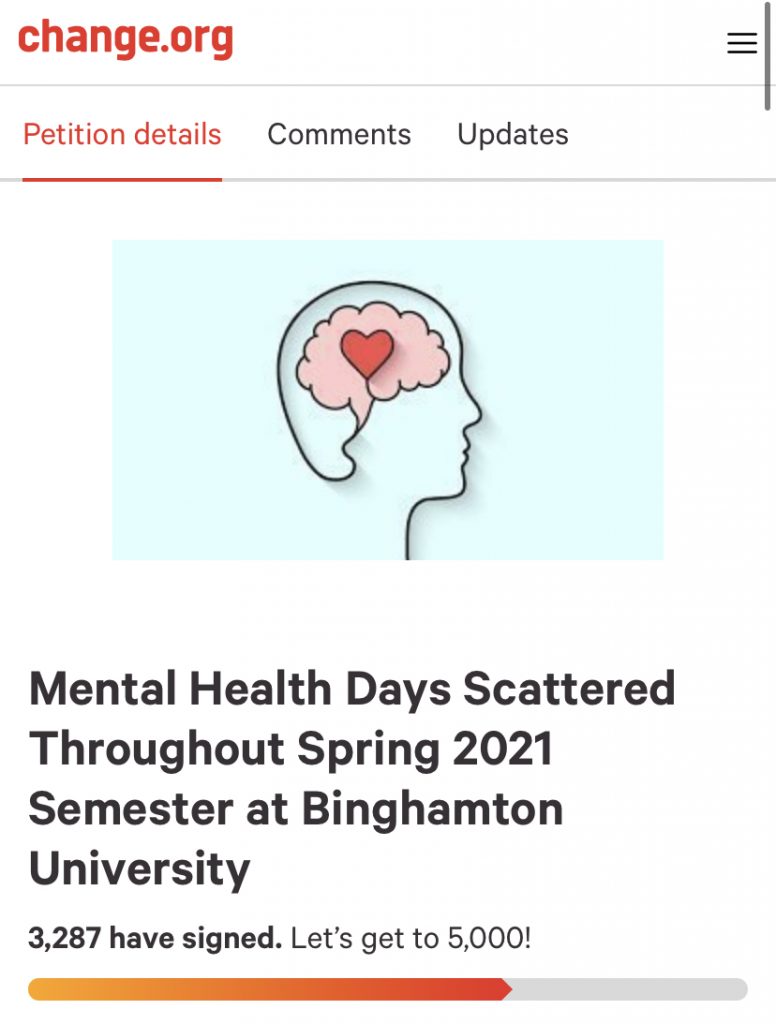In response to growing concerns surrounding students’ mental health this semester, Binghamton University has added three wellness days to the spring 2021 academic calendar.
The spring 2021 semester will have three nonconsecutive break days, which were originally allocated for snow days, to alleviate student stress. BU President Harvey Stenger announced the implementation of wellness days on Twitter Tuesday morning.
“A top priority for [BU] is [students’] mental health and wellness,” Stenger wrote. “To help our students get some much-needed time to recharge during the spring semester, we will schedule three nonconsecutive days off. These days will be determined by the [Student Association] and Student Congress.”
This decision was made following a discussion between the administration and the Student Association (SA). Khaleel James, SA president and a senior double-majoring in economics and human development, pitched the idea for wellness days following a joke about snow days in a one-on-one meeting with Stenger.
“One of the jokes I said was that we probably won’t ever have any more snow days because we will just [be taking classes] on Zoom moving forward,” James wrote in an email. “This year I saw and heard many students express that they are fatigued. I said to [Stenger] in one of our weekly one-on-one meetings that the University [should use] snow days that are already allocated in the semester to help students with the extensive length of the spring semester, seeing that there is no spring break or break in general.”
Before Stenger’s announcement, Diana Riestra, a junior majoring in biology, formed a petition asking the University to implement wellness days. As of Nov. 18, the petition had 3,312 signatures. Parents, faculty, undergraduate and graduate students have commented with concerns and personal stories about the problems the University community has faced due to the lack of breaks in the fall semester.
Riestra said she was motivated to start the petition after observing the stress her peers were under.
“I chose to start this petition because I have noticed that my friends and I have been feeling extremely burned out this semester,” Riestra wrote in an email. “The amount of work assigned with absolutely no break from it has been taking a huge toll on people’s mental health — messing up their sleep schedules, increasing their already high levels of anxiety and even affecting whether they had enough time to feed themselves.”
Not thinking of herself as the type of person to start a petition, Riestra said she was “so fueled with frustration” that she opted to take matters into her own hands.
“The conversations I had with my friends and peers led me to the idea of creating a petition for random rest days next semester,” Riestra wrote. “Since administration may be disconnected from the rigorous work students have to do on a day-to-day basis, I wanted to find a smart way to reach out to them, through the voices of [BU] students. I chose to take the initiative because I had mentioned starting a petition to a few pals, but it was never done.”
James echoed Riestra’s sentiments, stating that his experiences speaking to fellow students influenced his desire to take action.
“This came to me in my [Human Development 400: Social Justice] class when my fellow classmates asked me what I can do to help,” James wrote. “So some of the credit has to go to my classmates and [Denise Yull, chair and associate professor of the College of Community and Public Affairs (CCPA) human development] for allowing her students to express how they are feeling through the semester. It was there in that moment where I realized this was a seriously needed thing for the students, faculty, staff and administration to have. We all need a few days to just breathe and focus on our wellness.”
Coda Winters, a second-year graduate student studying student affairs administration, expressed dissatisfaction with the University’s approach this past semester.
“As a graduate student, I’ve run into wall after wall this semester because of the lack of breaks,” Winters said. “I completely understand the constraints due to the pandemic, but this could’ve been avoided by elongating the semester rather than shortening it in order to include breaks. I feel that there should have been more mental health and other supportive outreach throughout the semester. I received an email from CCPA reaching out to ask what they can do to support me this past Friday. There’s less than a month left of classes … What kinds of interventions could be implemented in this short of a time if I was in need of it? These outreaches should’ve been done early and semi-frequently in order to really engage students and secure their success.”



